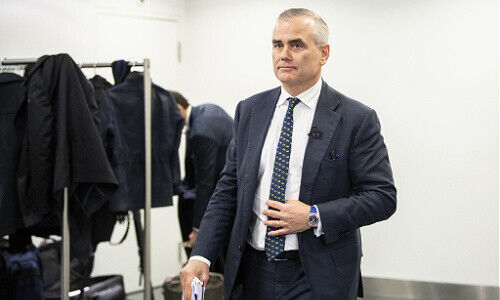The crisis-roiled bank reinforced the importance of «Suisse» in its name with two Swiss natives at the top. CEO Thomas Gottstein faces a tricky challenge.
For once, Swiss banks or at least Credit Suisse earned praise from London: the otherwise more critical financial center towards Switzerland attested the ouster of Chairman António Horta-Osório with a remarkable amount of praise and in the process revealed that they view the Portuguese banker's legacy with some reservations. Before Credit Suisse, Horta-Osório was the CEO of British bank Lloyds for ten years, where he mounted a turnaround, but also cut 15,000 jobs. The United Kingdom hasn't forgotten this.
The praise from London is per se pleasing, but puts Switzerland's second-largest bank under massive pressure, namely its CEO Thomas Gottstein. It falls to him to bring the bank amidst all its still unresolved problems back on the road to recovery. This won't be easy, especially as the the «new» Credit Suisse two people at the helm (Gottstein and Chairman Axel Lehmann) who aren't particularly well-known outside of Switzerland.
Soon A Disadvantage?
In other words, what was an advantage at the beginning of this week could very soon turn into a disadvantage: Swissness alone – as desirable as it is – is not impressive in the mid-term. International presence is required. Credit Suisse had it good in this respect in the past: all three of its last CEOs (Oswald Gruebel, lived and worked in London for a long time), Brady Dougan (a typical Wall Street banker) and Tidjane Thiam (an unparalleled cosmopolitan) served Credit Suisse beautifully internationally.
Where does it stand now? Gottstein needs to clarify that he is not part of the problems besetting Credit Suisse right now but that he can solve them. He must also put his Swiss, down-to-earth and until now pleasantly modest way which has served him well until now aside. Instead, he needs to embody the international dimension of Credit Suisse.
International More Standing
Only by doing so will the bank be able to convince potential investors, so that the share price which has languished for what seems like forever recover.
Credit Suisse insiders report that this task has the highest priority. It is not about finding a replacement for Gottstein or to question the appointment of Lehmann, but to help Switzerland's second-largest bank to more standing among international banks.
Develop A Modus Vivendi
The CEO will need to develop a modus vivendi with the most important institutions and leading financial outlets (Financial Times, Wall Street Journal, Reuters, and Bloomberg) so that he doesn't need to fear an attack by Anglo-Saxon journalists as soon a new problem emerges on the horizon; moreover a discourse should develop in which Gottstein is viewed as an «elder statesman» so to speak.
In principle as poised as other banking CEOs have also managed, if one thinks of Lloyd Blankfein or Jamie Dimon. The latter even joked about China's Communist Party recently, without enduring massive consequences.
Unter this circumstances, Credit Suisse's Swissness fades somewhat into the background, especially because significant shareholders are found in an international context, and where Credit Suisse needs to prove itself in the next two years – as a respected bank in high finance.



































